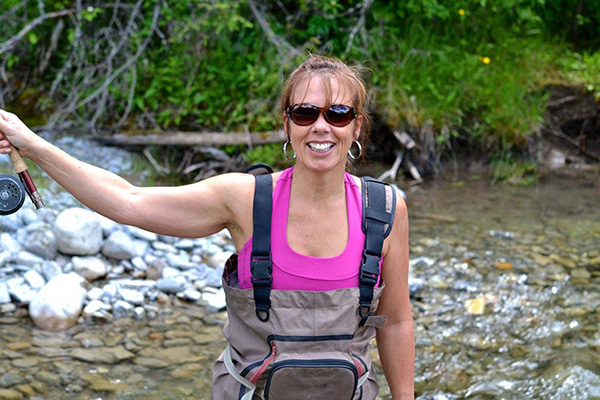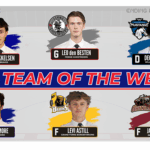Home »

Inspired by setbacks, instructor champions the underdog

College of the Rockies People: Their Courage, Curiosity, and Contributions
When College of the Rockies University Studies Sciences instructor Leslie Molnar attended university, she had dreams of becoming a professional musician.
They didn’t work out. But, funny enough, life still did: the reality of her unexpected journey, combined with the dissolution of a dream, left Molnar with a profound learning experience she embraces to this day.
“When I was pursuing music, I had the experience of working really hard at something and only being mediocre at it,” she said. “I worked so hard, and to not excel was a powerful experience.”
With her music dreams dashed, Molnar shifted her education to math, a subject that came more easily to her, but presented a different set of challenges to overcome.
One of only two females in her classes, Molnar found it was always a battle to be taken seriously.
“I had to prove not only that I could do the material, but that I belonged there,” she said. “It was always a fight, and I never forget that either.”
Not one to back down from a challenge, Molnar excelled, earning the highest mark on numerous assignments and exams. By working harder and being better, she made those around her take notice.
 Molnar earned a Bachelor of Science in Mathematics and, 30 years ago, began doing tutorials at College of the Rockies. She went on to earn a Masters of Arts in Administration Curriculum and Instruction before joining the college as a full-time instructor of calculus, statistics, finite math, and sometimes business courses.
Molnar earned a Bachelor of Science in Mathematics and, 30 years ago, began doing tutorials at College of the Rockies. She went on to earn a Masters of Arts in Administration Curriculum and Instruction before joining the college as a full-time instructor of calculus, statistics, finite math, and sometimes business courses.
“I love math, partly because it has such a bad reputation. People are afraid of it and they think they can’t do it. Some think there are people with a math brain, and people without a math brain. I don’t believe that is true. I think, especially today, students have been part of so many different educational experiments that there are holes in their background, and that is what is holding them back.”
She also recalls what it’s like to struggle.
“I remember back to when I was pursuing music and I can understand what my students may be going through,” Molnar said. “I understand the feeling of working really, really hard and not being as good as other people who don’t even seem to be working at it. I use my personal experience to find ways to help my students today.”
 One unique way Molnar does this is by creating gamification elements into two of her calculus courses.
One unique way Molnar does this is by creating gamification elements into two of her calculus courses.
“Calculus probably has one of the highest failure rates, not only here, but nationally and internationally,” she said. “We have to change the way we teach it. Students coming up now grew up with games. Introducing game elements into a course can help people learn and provides the opportunity and freedom to fail, to learn from their mistakes, and to ultimately master the material.”
Molnar explains that through gamification, students have more freedom in their learning. If they don’t do well at a concept the first time, they can keep trying. They can choose what route they take to get from one point to another, or from one concept to another. Just like in an online game, students need to gain mastery in an element (or a concept) in order to move on to the next step, all the time receiving rewards like badges or stars for successes along the way.
“Games have a positive association, whereas math has a negative association,” Molnar said. “It’s not that these courses are a computer game, it’s just adding in these game elements. I think it is a really promising approach.”
Her colleagues in post-secondary seem to agree. Molnar has been asked to present at several conferences, recently presenting at the International Academic Forum (IAFOR), held in Hawaii. As she incorporates Open Source textbooks and assignment applications in her courses, she was recently recognized as an Open Educational Resource Champion for her use of online resources in her teaching, which save her students the expense of a textbook.
 It’s not only her students who benefit from Molnar’s passion for advocacy. She is currently the second vice-president of the Federation of Post-Secondary Educators and does a lot of work for her fellow faculty members.
It’s not only her students who benefit from Molnar’s passion for advocacy. She is currently the second vice-president of the Federation of Post-Secondary Educators and does a lot of work for her fellow faculty members.
“Being a female in a male-dominated field, you learn early on that there’s people whose voices aren’t heard,” she said. “I think the fact that I’ve dealt with so much conflict, I’m not afraid of it. I mean, it’s not pleasant, but I’m not afraid of conflict. I like to help people get their problem solved.”
 When not supporting for her students and colleagues or spending time with her three grown children, Molnar spends time with the other love of her life, a Triumph Bonneville motorcycle.
When not supporting for her students and colleagues or spending time with her three grown children, Molnar spends time with the other love of her life, a Triumph Bonneville motorcycle.
 She and her husband Mark have enjoyed day trips on their bikes along Going-to-the-Sun Highway in Montana, and through the West Kootenay. Favourite longer excursions have included the Oregon Coast, southern Utah, the Grand Canyon, the Colorado Rockies, and the Sunshine Coast.
She and her husband Mark have enjoyed day trips on their bikes along Going-to-the-Sun Highway in Montana, and through the West Kootenay. Favourite longer excursions have included the Oregon Coast, southern Utah, the Grand Canyon, the Colorado Rockies, and the Sunshine Coast.
She also enjoys reading, singing in a choir, and snowmobiling.
Looking back at the early struggles that shaped her to be the strong advocate she is, Molnar wouldn’t change a thing. And for that, her students and colleagues are grateful.
Lead image: Leslie Molnar. Photos submitted
College of the Rockies







